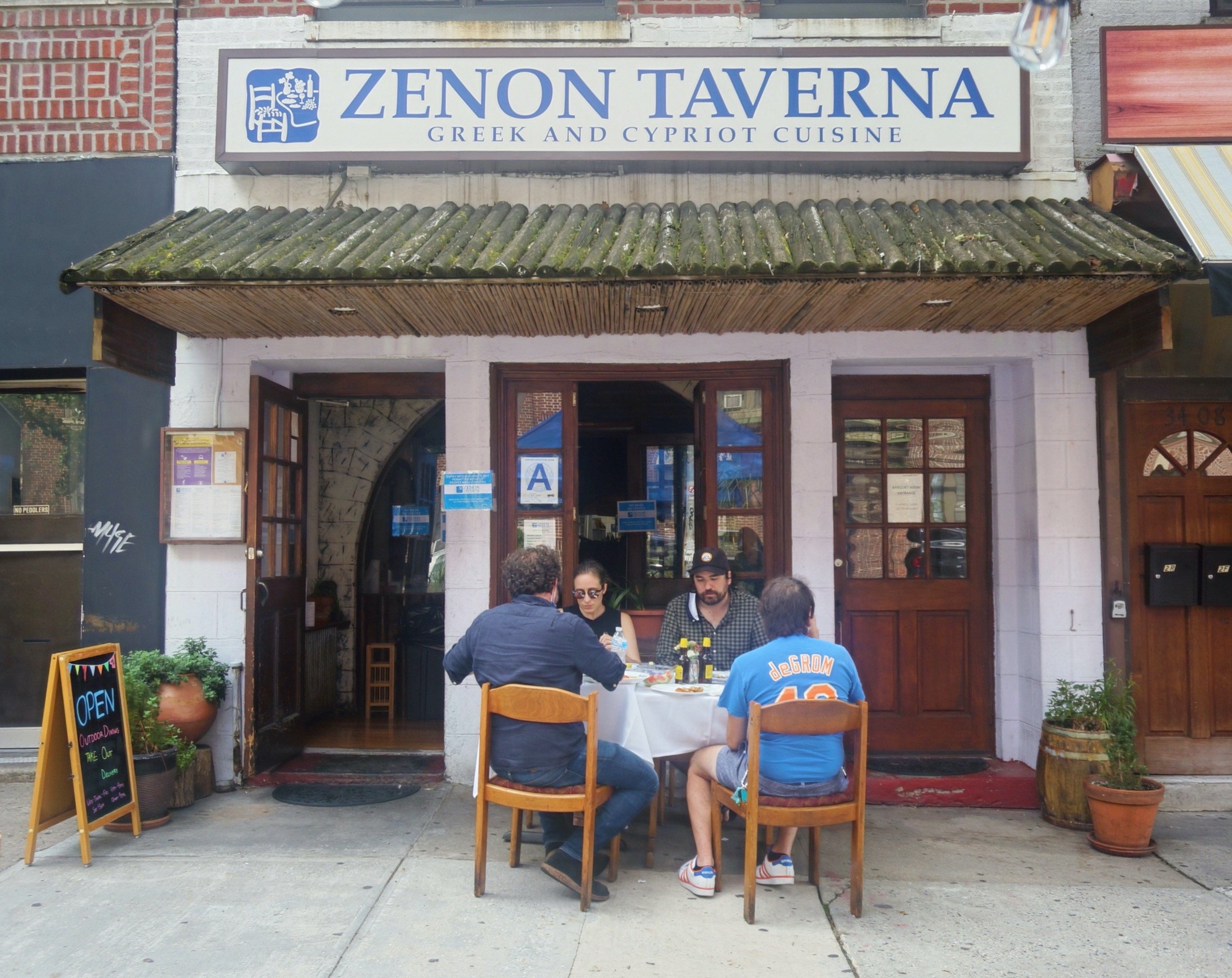A Mediterranean Enclave in New York
By Sean & Mark Mathews
Astoria, New York
The Queens neighborhood of Astoria has long been known as a home of Greek-American life. Just fifteen minutes from Manhattan across the Queensboro Bridge, the area first began attracting Greek immigrants in the 1950’s due to its proximity to the city but small village feel and affordable rents.
Many residents say the Greek population of Astoria peaked sometime in the late 70’s, yet visitors to the neighborhood looking for Greek atmosphere will not go home let down. The cafés and sidewalks of Ditmars Boulevard and Steinway Street still ring with the animated banter to remind one of an Athenian kafenio and warm Greek greetings like Kalimera! Yassou!
On a busy Saturday afternoon in August moped riders donning djellabas buzzed the streets and languages from across the Balkans could be heard at lunch tables. If anything, the changes to the neighborhood have only added another layer to its distinct Eastern Mediterranean make up.
“Astoria went from being around 75% Greek and Italian, to now having a significantly larger Middle Eastern population. The community has grown so big,” Elena Ioannidis, who runs her family’s Cypriot Restaurant Zenon Taverna with her husband Harry, told Levendeia.
The influx of other immigrants has shown how similarities between the different cultures of the Eastern Mediterranean compliment each other. Nowhere is this clearer than Ioannidis’s restaurant with its Greek Cypriot cuisine.
“Cyprus was always a really big trade route between Europe, Asia and Africa. Everyone left their mark on the island,” said Elena with a clear passion for the island’s history.
Cypriot recipes and dishes straddle the culinary world of Greek, Arabic and Turkish cuisine. Zenon Taverna offers a tahini mezze, various rakis, and mint based dishes including Cyprus’s own version of tzatziki, called talattouri, to stuffed grape leaves and Cypriot keftedes.
Diners enjoy outdoor lunch at Zenon Taverna
“We use curry, we use cumin from the Middle Eastern influence, we use rosewater in a lot of our desserts,” Ioannidis said.
Still, this little enclave of Mediterranean spirits, with its specialty cheeses, olives, and ubiquitous freddo-cappucinos, has not been immune to the changes in real estate that have swept through New York.
“It’s been gentrified,” George, a lifelong Greek-American resident of Astoria told Levendeia as he finished shopping outside the Mediterranean Foods grocery store. “It was always an ethnic neighborhood, but over the years, what happened is what’s happening all over New York City and other big metropolitan areas.”
“The way Manhattan has become now, to me it’s ‘Disney-fied.’ It’s priced a lot of people out and they are coming here,” he added.
Despite the changing demographics and real estate prices, what has not changed are the main focal points holding the Greek and Cypriot community together. Many parents choose to send their children to Greek school and numerous churches put on their own Greek festivals. Even many businesses have become cultural establishments.
Patrons of Lefkos Pyrgos Café on Ditmars Boulevard
“Everybody knows us as a Greek place,” said Manolis, who manages Lefkos Pyrgos Café, a Ditmars Boulevard institution which his aunt started in the 1970’s. “Everybody is welcome, but most of our customers are Greek. They come every morning and have a Greek coffee, maybe a cake. Exactly like the kafenio in Greece.”
Not surprisingly, while many of the Greek restaurants and businesses are still family run by younger generations, their customer base has broadened. “Five or ten years ago you saw mostly Greeks, maybe Italians, the same customers. But now you see many different people from all over,” explained Manolis from inside his family’s café.
Throughout the night in Astoria’s Greek cafés older generations slowly sip their Greek coffees and converse in their native tongue while families join tables together and order delicious baklava and cakes. Just down the street younger residents order guacamole and listen to Latin American music at a trendy Peruvian bar.
Pastry selection at Lefkos Pyrgos Café
The allure of Astoria’s proximity to the city will likely continue to draw in new faces, but for now, the Greek residents’ ties to their heritage and culture do not appear to be waning.
Reflecting on her upbringing, as well as the future of her children’s, Elena Ioannidis told Levendeia, “I was given the gift of our culture and traditions that I am now passing on to our children. Being able to pass that on is one of the things I feel we are most blessed with.”
Illustrating just how Greek Astoria remains, Ioannidis shared with us one of the questions often put to her when she returns to Cyprus, “People on the island will ask me ‘How do you speak Cypriot Greek so fluently?’” to which she aptly tells them, “I grew up in Astoria.”
Watch Levendeia's journey through Astoria here.



